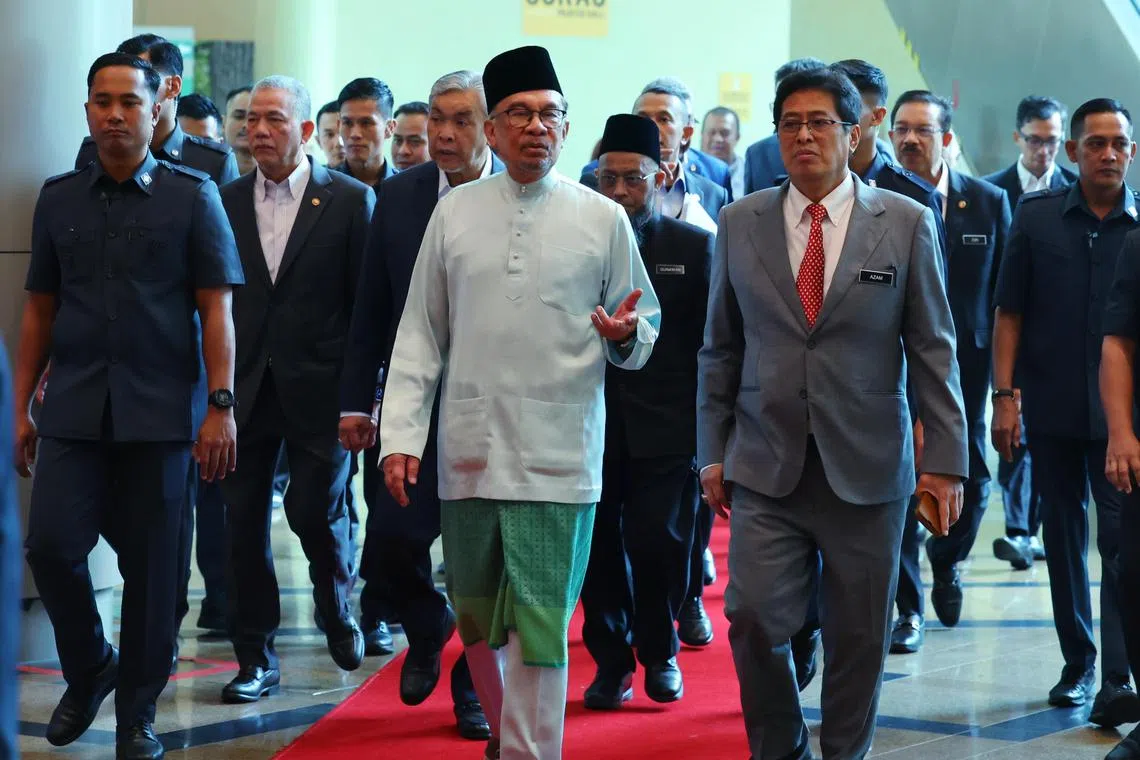Malaysia anti-graft chief’s 2nd term extension draws flak and questions over Anwar reforms
Sign up now: Get insights on the biggest stories in Malaysia

There were calls for a more transparent appointment process when Datuk Sri Azam Baki (right) was given his first extension as MACC chief in May 2023.
PHOTO: BERNAMA
KUALA LUMPUR - Prime Minister Anwar Ibrahim’s decision to again extend the tenure of controversial anti-graft chief Azam Baki has courted criticism amid growing concerns over corruption in Malaysia.
The decision has cast the spotlight on yet another promised reform
“The reappointment of an individual plagued with scandals he has not answered for, to such an important office is already disappointing,” said the Centre to Combat Corruption and Cronyism in a May 14 statement.
But “the fundamental issue” beyond Tan Sri Azam’s May 12 extension for another year, according to the graft watchdog, is that “the institutional capacity to combat corruption and uphold good governance... shall remain impaired without sufficient devolution of the powers... in the hands of the prime minister”.
There were calls for a more transparent process from civil society groups when Mr Azam was given his first extension as MACC’s chief commissioner in May 2023 after reaching the mandatory retirement age of 60.
Communications Minister Fahmi Fadzil, in his role as Cabinet spokesman, on May 15 acknowledged the right to express such concerns.
“But at the same time, there are several considerations made by Prime Minister Anwar in making this decision,” he said without giving details.
Mr Anwar had said at the Qatar Economic Forum on May 14 that it would be a “disaster” to expedite reforms by assuming that “the elites have all the answers without even interacting with the masses”.
The statement was widely mocked by analysts and civil society, with electoral reforms coalition Bersih pointing out that “for 25 years (in opposition), Anwar called for electoral reforms and the abolition of draconian weapons such as the Sedition Act
“How about separating the offices of prime minister and finance minister or imposing term limits for the prime minister?” asked Bersih executive director Ooi Kok Hin, referring to the campaign promises made by PH less than two years ago.
“Why are they (the reforms) suddenly ‘radical’ now?” he added, dismissing the notion that these reforms would shock the masses.
Mr Azam’s one-year extension came despite claims by activists and opposition figures of selective prosecution and abuse of power deepening in the past year.
An Ipsos poll in March showed that 47 per cent of Malaysians felt the country was heading in the wrong direction, compared with 26 per cent in January 2023, with corruption cited as the main concern.
The MACC head was already under a cloud prior to his first reappointment. Then, he had claimed that the publicly traded shares valued at close to RM1 million (S$287,000) that were in his account in breach of civil service rules in fact belonged to his brother, despite proxy trading being illegal.
Several graft cases pursued against corporate entities also raised eyebrows, with police investigating claims that the MACC aided a “corporate mafia” in hostile takeovers, an allegation repeated by a defence lawyer in court.
One such firm, Pestech, was vindicated in its claim of wrongful prosecution after graft charges filed against it in January 2023 were withdrawn six months later.
Investigations into former finance minister Daim Zainuddin – a fierce opponent of Mr Anwar – after he was named in the 2021 Pandora Papers, which incriminated hundreds worldwide in tax avoidance and corruption, were panned as others who were also listed, such as Deputy Prime Minister Zahid Hamidi and Investment, Trade and Industry Minister Tengku Zafrul Aziz, escaped the probe.
Daim and his wife were eventually charged in January with failure to disclose assets,
This was reinforced when Mr Anwar’s long-time nemesis, former premier Mahathir Mohamad, was subsequently investigated, with his businessmen sons asked in January to furnish financial documents dating back to when their father first took power in 1981.
Tun Dr Mahathir dismissed the investigations as “political” in a May 10 interview with The Straits Times, pointing to how months had passed but “they haven’t questioned me”.
Even PH parliamentarian Lim Lip Eng has twice complained about MACC extorting and robbing victims, with the latest being a claim that three rogue officers were in cahoots with a leader from Mr Anwar’s party to defraud a Chinese national. The trio were charged in December 2023 with robbery.
These episodes cast a shadow on Mr Anwar’s oft-repeated war against graft as Malaysia targets a spot in the top 25 of the Corruption Perception Index’s (CPI) ranking of nations by 2033. Supporters have trumpeted Malaysia’s improvement to 57th place in 2023 from 61st previously, with a score of 50 points, up from a decade low of 47.
However, the CPI study ends in August every year, which means it was concluded before Datuk Seri Zahid 47 graft charges were controversially dropped
Dr Muhammad Mohan, president of the Malaysia chapter of Transparency International, which publishes the CPI, said Mr Zahid’s discharge not amounting to an acquittal (DNAA) saw many “learning about it, to the point that even the makcik selling pisang goreng (banana fritters) by the roadside knows what a DNAA is”.
When detailing Malaysia’s CPI position in January, Dr Muhammad called for the prime minister to be taken “out of the equation” in appointing the MACC chief.
Mr Azam’s new contract came days after he said at the launch of the National Anti-Corruption Strategy (NACS) for 2024 to 2028 that RM277 billion in economic value was lost to corruption between 2019 and 2023. The National Anti-Corruption Plan for the latter period was put in place by then Prime Minister Mahathir. Mr Azam has headed MACC since 2020, after Dr Mahathir was ousted from power, and was deputy chief from 2016.
“Show how you reach that figure. What is the evidence?” Dr Mahathir challenged during the ST interview.
The NACS sets out only a review of the appointment of the MACC chief commissioner as a long-term goal to be achieved in four to five years.
Institute for Democracy and Economic Affairs chief executive Tricia Yeoh told ST this reform appeared to be a “shifting goal post” with no political will behind it.
“We don’t see any real efforts towards reforming the appointment process of the MACC chief. Making the appointment process more transparent would certainly ease concerns over the institution’s convenient use by the executive as a political tool.”



